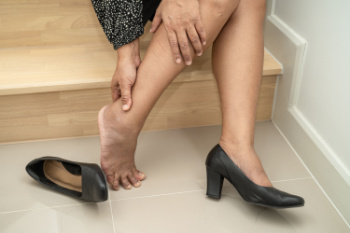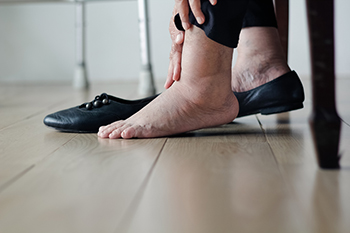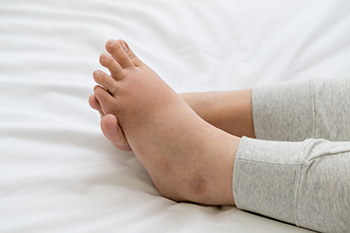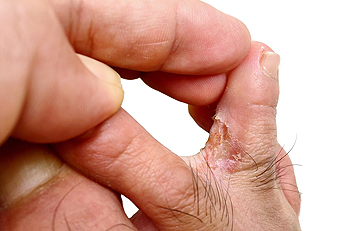Items filtered by date: January 2024
Common Reasons for Foot Pain

Foot pain can be attributed to several causes that often affect individuals irrespective of age or lifestyle. Plantar fasciitis, a condition characterized by inflammation of the tissue connecting the heel bone to the toes, can lead to stabbing pain upon standing. Another common offender is bunions, the bony protrusions that form at the base of the big toe, causing discomfort and altering foot structure. Arthritis, an inflammatory joint condition, can afflict the feet, resulting in persistent pain and reduced mobility. Strained or overworked muscles, often a consequence of prolonged standing or intense physical activity, can contribute to general foot soreness. Wearing ill-fitting footwear, such as tight shoes or high heels, can also be a frequent source of pain. Understanding these common triggers for foot discomfort is essential for effective prevention and management. If you have foot pain for any reason, it is strongly suggested that you schedule an appointment with a podiatrist who can determine the cause and offer effective treatment methods.
Foot Pain
Foot pain can be extremely painful and debilitating. If you have a foot pain, consult with Dr. Ronald Sheppard from Warren-Watchung Podiatry Center. Our doctor will assess your condition and provide you with quality foot and ankle treatment.
Causes
Foot pain is a very broad condition that could be caused by one or more ailments. The most common include:
- Bunions
- Hammertoes
- Plantar Fasciitis
- Bone Spurs
- Corns
- Tarsal Tunnel Syndrome
- Ingrown Toenails
- Arthritis (such as Gout, Rheumatoid, and Osteoarthritis)
- Flat Feet
- Injury (from stress fractures, broken toe, foot, ankle, Achilles tendon ruptures, and sprains)
- And more
Diagnosis
To figure out the cause of foot pain, podiatrists utilize several different methods. This can range from simple visual inspections and sensation tests to X-rays and MRI scans. Prior medical history, family medical history, and any recent physical traumatic events will all be taken into consideration for a proper diagnosis.
Treatment
Treatment depends upon the cause of the foot pain. Whether it is resting, staying off the foot, or having surgery; podiatrists have a number of treatment options available for foot pain.
If you have any questions, please feel free to contact one of our offices located in Marlboro and Watchung, NJ . We offer the newest diagnostic and treatment technologies for all your foot care needs.
How Aging Can Affect Your Feet

Aging gracefully is a journey that encompasses various changes throughout the body, and the feet are no exception. The intricate network of bones, muscles, and joints in the foot makes it particularly susceptible to the effects of aging. Certain conditions may arise, including plantar fasciitis, flat feet, and osteoarthritis. Plantar fasciitis involves inflammation of the ligament, called the plantar fascia, on the bottom of the foot. This condition often results from participating in high-impact exercises or wearing ill-fitting shoes. The telltale sign is sharp heel pain, especially pronounced in the morning. Flat feet, a consequence of aging and genetic predisposition, can lead to tired feet, painful arches, and swelling on the inner sides. This condition occurs when the supporting tendons and ligaments lose elasticity, a common side effect of aging, and causes the arches to weaken. Osteoarthritis, a prevalent concern for adults over 65, can affect the feet due to the intricate structure of bones and joints. While age increases the risk, repeated ankle sprains may also contribute to arthritis. If you are experiencing any of these foot problems, it is suggested that you schedule an appointment with a podiatrist.
Proper foot care is something many older adults forget to consider. If you have any concerns about your feet and ankles, contact Dr. Ronald Sheppard from Warren-Watchung Podiatry Center. Our doctor can provide the care you need to keep you pain-free and on your feet.
The Elderly and Their Feet
As we age we start to notice many changes in our body, but the elder population may not notice them right away. Medical conditions may prevent the elderly to take notice of their foot health right away. Poor vision is a lead contributor to not taking action for the elderly.
Common Conditions
- Neuropathy – can reduce feeling in the feet and can hide many life-threatening medical conditions.
- Reduced flexibility – prevents the ability of proper toenail trimming, and foot cleaning. If left untreated, it may lead to further medical issues.
- Foot sores – amongst the older population can be serious before they are discovered. Some of the problematic conditions they may face are:
- Gouging toenails affecting nearby toe
- Shoes that don’t fit properly
- Pressure sores
- Loss of circulation in legs & feet
- Edema & swelling of feet and ankles
Susceptible Infections
Diabetes and poor circulation can cause general loss of sensitivity over the years, turning a simple cut into a serious issue.
If you have any questions please feel free to contact one of our offices located in Marlboro and Watchung, NJ . We offer the newest diagnostic and treatment technologies for all your foot and ankle needs.
Potential Foot Injuries From Playing Pickelball

Pickleball, a sport combining elements of tennis, badminton, and table tennis, has surged in popularity, drawing players of all ages to its fast-paced and engaging court. As enthusiasts partake in this low-impact but high-energy activity, it is essential to be mindful of potential foot injuries associated with the sport. The dynamic lateral movements, abrupt stops, and quick pivots integral to pickleball can put strain on the feet, making players susceptible to injuries. Common foot issues may include ankle sprains due to sudden changes in direction, plantar fasciitis from repetitive jumping and running, and stress fractures resulting from the intense impact on the feet. Understanding the sport's demands and the potential injuries it can cause enables players to adopt preventive measures, such as wearing proper footwear, engaging in stretching routines, and getting adequate rest. If you have endured a foot injury from playing pickleball, it is suggested that you visit a podiatrist who can treat it accordingly.
Ankle and foot injuries are common among athletes and in many sports. They can be caused by several problems and may be potentially serious. If you are feeling pain or think you were injured in a sporting event or when exercising, consult with Dr. Ronald Sheppard from Warren-Watchung Podiatry Center. Our doctor will assess your condition and provide you with quality foot and ankle treatment.
Common Injuries
The most common injuries that occur in sporting activities include:
- Achilles Tendonitis
- Achilles Tendon Rupture
- Ankle Sprains
- Broken Foot
- Plantar Fasciitis
- Stress Fractures
- Turf Toe
Symptoms
Symptoms vary depending upon the injury and in some cases, there may be no symptoms at all. However, in most cases, some form of symptom is experienced. Pain, aching, burning, bruising, tenderness, tightness or stiffness, sensation loss, difficulty moving, and swelling are the most common symptoms.
Treatment
Just as symptoms vary depending upon the injury, so do treatment options. A common treatment method is known as the RICE method. This method involves rest, applying ice, compression and elevating the afflicted foot or ankle. If the injury appears to be more serious, surgery might be required, such as arthroscopic or reconstructive surgery. Lastly, rehabilitation or therapy might be needed to gain full functionality in the afflicted area. Any discomfort experienced by an athlete must be evaluated by a licensed, reputable medical professional.
If you have any questions, please feel free to contact one of our offices located in Marlboro and Watchung, NJ . We offer the newest diagnostic and treatment technologies for all your foot care needs.
Heel Pain Can Be Treated!
Reasons Why Only One Foot Can Become Swollen

Experiencing swelling in one foot can be a perplexing and discomforting issue with various underlying causes. Trauma, such as a sprain or injury, often leads to localized swelling, restricting fluid flow in the affected area. Deep vein thrombosis, a blood clot in the leg, may cause one foot to swell due to compromised circulation. Inflammatory conditions like arthritis can contribute to unilateral swelling, affecting the joints and soft tissues. Lymphatic issues, such as lymphedema, result in fluid retention and swelling, predominantly on one side. Foot infections, including cellulitis, can lead to localized swelling as the body responds to the infectious agents. Vascular problems, like peripheral artery disease, may cause poor blood flow to one foot, resulting in swelling. Understanding the reasons is critical for seeking timely medical attention, as addressing the underlying cause is essential in managing and alleviating the swelling in a singular foot. If you have one foot that is swollen, it is strongly suggested that you consult a podiatrist who can determine the cause and offer effective relief and treatment options.
Swollen feet can be a sign of an underlying condition. If you have any concerns, contact Dr. Ronald Sheppard of Warren-Watchung Podiatry Center. Our doctor can provide the care you need to keep you pain-free and on your feet.
Swollen feet are a common ailment among pregnant women and people who stand or sit for extended periods. Aging may increase the possibility of swollen feet and patients who are obese often notice when their feet are swelling too. There may be medical reasons why swollen feet occur:
- Phlebitis - A condition that causes the veins to become inflamed and can also cause leg pain.
- Liver disease - This may lead to low blood levels of albumin which is a protein. This can cause fluid in the blood to pass into the tissues and several areas of the body can become swollen.
- Heart failure - When the heart doesn’t pump properly the blood that is normally pumped back to the heart can pool in the veins of the legs causing swollen feet.
- Kidney disease - One of the main functions of the kidneys is releasing excess fluid in the body. This type of condition can make it difficult for the kidneys to function properly, and as a result the feet may become swollen.
- Deep-vein thrombosis (DVT)- This is a serious condition where blood clots form in the veins of the legs. They can block the return of blood from the legs to the heart which may cause the feet to swell. It is important to be treated by a podiatrist if this condition is present.
Swollen feet can also be caused by bone and tendon conditions, including fractures, arthritis, and tendinitis. Additionally, there may be skin and toenail conditions and an infection may cause the feet to swell. Patients who take medicine to treat high blood pressure may be prone to getting swollen feet.
Many patients elevate their feet to help relieve the swelling and this is generally a temporary remedy. When a podiatrist is consulted the reason behind the swelling can be uncovered and subsequently treated.
If you have any questions please feel free to contact one of our offices located in Marlboro and Watchung, NJ . We offer the newest diagnostic tools and technology to treat your foot and ankle needs.
The Vital Role of Hygiene in Combating Athlete's Foot

Athlete's foot, a common fungal infection, underscores the significance of daily foot hygiene in preserving overall health. This condition thrives in warm, moist environments, making it imperative for individuals, especially athletes, to prioritize cleanliness. Regular washing and thorough drying of feet, paying particular attention to spaces between toes, can deter the growth of fungi. Choosing moisture-wicking socks and breathable footwear is essential to minimize the conditions favorable for the infection. Sharing personal items, such as towels or shoes, should be avoided to prevent the spread of the fungus. Maintaining clean, dry feet not only aids in preventing athlete's foot but also promotes the general well-being of the feet. Vigilance in hygiene practices, coupled with prompt treatment if symptoms arise, empowers individuals to protect their feet from the discomfort and inconvenience associated with athlete's foot infection. If you have developed athlete’s foot, it is strongly suggested that you are under the care of a podiatrist to discuss effective treatment methods, which may include prescribed medication.
Athlete’s Foot
Athlete’s foot is often an uncomfortable condition to experience. Thankfully, podiatrists specialize in treating athlete’s foot and offer the best treatment options. If you have any questions about athlete’s foot, consult with Dr. Ronald Sheppard from Warren-Watchung Podiatry Center. Our doctor will assess your condition and provide you with quality treatment.
What Is Athlete’s Foot?
Tinea pedis, more commonly known as athlete’s foot, is a non-serious and common fungal infection of the foot. Athlete’s foot is contagious and can be contracted by touching someone who has it or infected surfaces. The most common places contaminated by it are public showers, locker rooms, and swimming pools. Once contracted, it grows on feet that are left inside moist, dark, and warm shoes and socks.
Prevention
The most effective ways to prevent athlete’s foot include:
- Thoroughly washing and drying feet
- Avoid going barefoot in locker rooms and public showers
- Using shower shoes in public showers
- Wearing socks that allow the feet to breathe
- Changing socks and shoes frequently if you sweat a lot
Symptoms
Athlete’s foot initially occurs as a rash between the toes. However, if left undiagnosed, it can spread to the sides and bottom of the feet, toenails, and if touched by hand, the hands themselves. Symptoms include:
- Redness
- Burning
- Itching
- Scaly and peeling skin
Diagnosis and Treatment
Diagnosis is quick and easy. Skin samples will be taken and either viewed under a microscope or sent to a lab for testing. Sometimes, a podiatrist can diagnose it based on simply looking at it. Once confirmed, treatment options include oral and topical antifungal medications.
If you have any questions, please feel free to contact one of our offices located in Marlboro and Watchung, NJ . We offer the newest diagnostic and treatment technologies for all your foot care needs.

